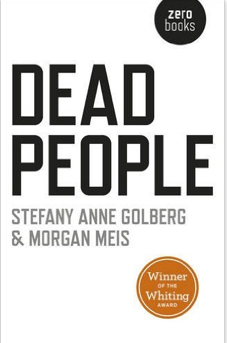 Twenty-eight eulogies of “intellectuals like Susan Sontag, Christopher Hitchens and Eric Hobsbawn; musicians like Sun Ra, MCA (Beastie Boys) and Kurt Cobain; writers like David Foster Wallace, John Updike and Tom Clancy; artists like Thomas Kinkade and Robert Rauschenberg; and controversial political figures like Osama bin Laden and Mikhail Kalashnikov” are included in Dead People, by Stefany Anne Golberg and 2013 Whiting Award winner Morgan Meis.
Twenty-eight eulogies of “intellectuals like Susan Sontag, Christopher Hitchens and Eric Hobsbawn; musicians like Sun Ra, MCA (Beastie Boys) and Kurt Cobain; writers like David Foster Wallace, John Updike and Tom Clancy; artists like Thomas Kinkade and Robert Rauschenberg; and controversial political figures like Osama bin Laden and Mikhail Kalashnikov” are included in Dead People, by Stefany Anne Golberg and 2013 Whiting Award winner Morgan Meis.
David Lull reports that the essay by Meis on Updike was first published on the Smart Set website as “Updike the Synthesizer.”
In it, Meis cites a descriptive passage of Updike’s and observes, “Reading the above passage from Rabbit, Run, I felt like I was reading one of [John] Dos Passos’ Newsreels. But it also made me realize how much Dos Passos’ USA, brilliant as it is, is a kind of failure. Dos Passos never came up with a sufficient technique by which the bits of actual experience, the real stuff of the time, the names, the brands, the popular songs, etc., could live in the individual stories he was trying to tell. Dos Passos puts those things into his novel, but he has to keep them separate, he has to show that they are ultimately ephiphenomenal to the ‘real’ story.
“Amazingly and consistently, but for the one passage in which he resorts to that long list of stuff on the radio, Updike resists the impulse to divide levels of experience. There is a kind of deep metaphysical democracy to Updike’s prose. The details matter, the specific show being watched on television, the kind of car being driven, because those details are wrapped up in the substance of the experience.”
